#like the mice in cinderella.........
Explore tagged Tumblr posts
Note
I already knew that it was just because something is deeply wrong with him, but since the marketing indicates that Lucanis is one of the earlier companions recruited, it’s even more insane that he chose to sleep in the pantry. It’s not like the lighthouse was all filled up, he could’ve had Emmrich’s palatial library room he just decided he’d rather live like the mice in Cinderella
i saw a video prior to his recruitment where rook went into his room and the game helpfully told you you had entered the pantry. took me out in one shot. it really is just the pantry. what’s wrong with him
#like the mice in cinderella.........#veilguard spoilers#lucanis dellamorte#i truly cant wait to hear his in-game explanation for this.
181 notes
·
View notes
Text

a much deserved, big chonky cheese for the world's best lil squire
#see i cleaned it like i said#cinderellas castle#cinderellas castle crumb#starkid#joey richter#musicals#mice#squire#cheese#dakodoodles
720 notes
·
View notes
Text


a little ref sheet for my tav, Wander (they/them) :)
theyre the scariest looking guy youve ever met but are actually just a pacifist minding their own business (their business is talking to birds)
#OC#dragonborn#wander#tav#bg3#their scales make it look like they are covered in blood at all times so most ppl are afraid to approach them#they unfortunately have resting murder face also so ppl just assume theyre violent#meanwhile theyre literally cinderella singing to the mice and birds lmao
871 notes
·
View notes
Text

This was FAR from planned but me and a friend were talking about Disney au’s and my brain went ‘Beauty and the Beast’ and you know… 👀 Devious suits it.

Even Devious’ top subordinates get in on the au as always uwu
#he’s a villain but like sympathetically…to a degree#my friend actually said Devious should be Cinderella and his subordinates the mice#I’ll draw it…maybe xD#Ruslan did not have the personality type to be cogsworth#Sergei has the cogsworth attitude but aesthetically fits lumier how ever it’s spelt#This poor man and all these silly situations I put him in out of love#artists on tumblr#beauty and the beast#au#villain oc#disney au#original character#buggee art#Devious#character art#retro art#vintage style#comic book#beast#small artists#character artist#oc#oc au art
11 notes
·
View notes
Text
Does anyone know of any slash fanfiction about those two mice from Disney's Cinderella?
#i searched ao3 and am shocked to find none#okay so the story behind this is a loustat cinderella au fanfic i found#and i noticed it had armand/daniel in it#and i was like ''where do they fit into this???''#and i got excited bc i thought they were gonna be little gay mice together#i was disappointed to discover that they were not in fact mice#and now i'm consumed by a need for jaq/gus fanfic#so i can imagine them as dm#wtf is wrong with me lmao#iwtv#cinderella#devil's minion
3 notes
·
View notes
Note
oh my god rosin you’re rebloging OUAT posts??? i used watched that allllll the time! we truly have lived the same life <3 (also this is random but have you seen this animated show on netflix called the deep?)
used to watch ouat with my mom RELIGOUSLY back in the day.. even back then i knew whatever emma and regina had going on was kinda 😳 she started rewatching it recently so its been on my mind
also i havent watched the deep 😔
#i think the funniest thing in the show is rumplestiltskin.#first of all. insane choice of fairytale character to be one of the shows main villains.#second of all. did anyone ever buy anything from his pawn shop. ever.#third of all. what was he planning to do with cinderellas kid when he tried to steal it??#insane man. everything he does is off the walls ridiculous.#and dont get me started on the family tree..#peter pan is rumples dad.#rumples son had a kid with snow whites daughter#that kid was adopted by the evil queen. who is snow whites step mother.#prince charming is king georges son??? and was engaged to midases daughter#and snow whites daughter was also romantically involved with.#the huntsman. captain hook. and a flying monkey??#and the evil queen got with robin hood but robin hood also had a kid with her sister. the wicked witch of the west.#and their mom is the queen of hearts.#oh and little red riding hood got asked out on a date by one of cinderellas mice?#who was then killed by king george so that prince charming couldny be sheriff? or something??#there was a joke at one point in the show thst was like 'thank god the enchanted forest doesnt hsve thanksgiving'#and i think that might be the realest thing ever said
4 notes
·
View notes
Text

my biggest regret in life is making that fucking gay panic stolas image
#i wish i’d never made it genuinely#it physically pains me every time i see jt#will this be what i’ll be remembered by? gay panic stolas?#it only take like two minutes to make too#also idk what the fuck cinderella mice means#shortbreadly rambles
11 notes
·
View notes
Text
Unfortunately, despite my attempts to appear well-adjusted, knowing me irl means that, with time, you will soon hear me devolve into more and more insane voices as I putter around until you hear me by myself in the backrooms while sweeping doing bad gollum impressions
#ghost posts#jk jk it’s most likely the mice from Cinderella#w my dogs it’s the tour guide Barbie voice#or might guy from Naruto
4 notes
·
View notes
Text
Just skimmed through this video about a new little mermaid book just to see the pictures (I was curious but didn’t want too too many spoilers) and learned some things about the movie.
- Eric is a collector of mermaid stuff or just anything from the actual sea?? That’s so cool, though it might seem a little too on the nose like ‘we’re gonna make this love interest relatable to the mc by making him exactly like her’ I hope they do it well. It’d be incredible if they gave us an autism-coded special interest type of dynamic with them, since cartoon Ariel is already a well known case of accidental autism representation.
- The pink dress we’ve seen on dolls will be the wedding dress. That’s neat, I don’t care when it shows up as long as it’s pretty. Maybe parents will be mad that the wedding dress isn’t white, but people only made up ‘white dress = virginity’ in the last couple hundred years in mostly western culture, and most people know this. And the dress is very pastel anyway. So I can’t see it being a huge issue outside of facebook boomer groups lol.
- It looks like Ariel will steer the ship to kill Ursula. I’d actually heard of this before and people were mad about it. I don’t care either way, I like that Eric kills her in the original because it’s something that shows he loves Ariel and his enchantment to love Ursula/Vanessa is fully broken. But I equally like the idea of Ariel stepping up to defeat her. People criticizing it seem to think the new message is that ‘girls have to do everything and can’t ask for help anymore’ which is the stupidest shit I’ve ever heard sorry. I really don’t think it’s that deep either way. Ariel in the original isn’t a damsel in distress, but her killing Ursula doesn’t make her some burdened warrior who has to do everything herself. She’s the main character, it makes sense for her to kill the villain.
(If I have any criticism for this change, it’s not about the character, it’s that she’s transformed back into a mermaid at this point, and the image of her steering the ship kneeling on her tail is very silly. It’s gonna get roasted to hell.)
#the little mermaid#disney#there are other princess movies (mostly older ones) where the princess doesn’t kill the villain either but the princesses aren’t the main#characters either. like half of snow white and cinderella are dwarves and mice shenanigans. and I’m confident in my stance that the fairies#in sleeping beauty are the main characters#my words
3 notes
·
View notes
Text
After watching Cinderella (the original animated movie, which was my favorite as a child), it strikes me how it solves many common problems people have with this fairy tale. Like:
Why did they try to identify the mystery girl using her shoe size? Because the bullheaded king's only clue to her identity was the shoe the Grand Duke picked up off the steps.
Why didn't the prince recognize her by her face? Because his father wouldn't involve him in the process at all, and wasn't the one going around trying to find her.
Why did the prince want to marry a lady he only met that night? Because his father was going to force him to marry someone, and he genuinely liked this woman.
Why did Cinderella want to marry a man she only met that night? Because marriage was her best and most secure way to freedom. Fucked up, but you can't say it's unrealistic for the setting of a fairy tale. She also genuinely liked him.
If they're using the slipper to find her, wouldn't it be more sensible to search for the person with the other slipper? Yes. The King is purposefully nonsensical and the Duke is purposefully terrified enough of him to carry out his orders to the letter. Furthermore, they end up doing that in the end anyway, because the Duke's glass slipper is shattered, and Cinderella brings out the one she has to prove her identity.
Why didn't the stepmother and stepsisters recognize Cinderella at the ball? Because they were dancing too far away, and then left the party to dance in private, which was possible because the King wanted very badly for his son to hit it off with someone and tried to arrange the best conditions for that to happen.
Why didn't Cinderella save herself? Because in real life, abuse victims should not have to shoulder that responsibility, and usually can't. In real life, you need and deserve an external support system. Asking for help, in this kind of situation, is very important. She is saved by others because she is loved. Because she is not alone. Because she has friends who love her, and want her to be happy and safe and free. Because in real life, people who want to help someone who is suffering are like the mice. We can't pull out miracle solutions, but we can provide companionship and if we're in the right place at the right time, we can help the person find a better life.
Why didn't the fairy godmother save Cinderella from her abusive household, or try to help her sooner? Because she's magic, and magic can't solve your problems. Quote: "Like all dreams, well, I'm afraid it can't last forever." This (and Cinderella's dream of going to the ball) is a metaphor for pleasurable things in bad circumstances. An ice cream won't get rid of your depression, but it will provide you with momentary happiness to bolster you, as well as the reminder that happiness in general is still possible for you. Cinderella doesn't want to go to the ball so she can get away from her stepmother and stepsisters, or so she can meet someone to marry and leave with. She wants to go to the ball to remind herself that she can still have things she wants. That her desires matter. This is important because the movie does a very good job of illustrating Lady Tremaine's subtle abuse tactics, all of which invisibly press the message that Cinderella doesn't matter. While going to the ball and fulfilling her dreams may not be a victory in the material sense, it is still a victory against Lady Tremaine's efforts.
Why is Cinderella's choice to be kind and obedient framed as a good thing, when you are not obligated to be kind to your abuser? This one walks a very fine line, but I think the movie still makes it make sense. Lady Tremaine never acknowledges her cruelty. She always frames her punishments of Cinderella as Cinderella's fault. Cinderella is interrupting, Cinderella is shirking her duties, Cinderella is playing vicious practical jokes. Cinderella is still a member of the family, of course she can go to the ball, provided she meet these impossible conditions. Lady Tremaine's tactics are designed to make Cinderella feel like she must always be in the wrong and her stepmother must always be in the right. If Cinderella calls her stepmother out on her cruelty, or attempts to fight back, Lady Tremaine can frame that as Cinderella being ungrateful, cruel, broken, evil, etc. If Cinderella responds to her stepmother's cruelty defiantly (in the way she's justified to), she's not taking control out of Lady Tremaine's hands. Disobedience can be spun back into her stepmother's control. She wants Cinderella to be angry and sad and show how much she's hurting. So since Cinderella is adapting to her situation, she chooses to be kind. Not only because she naturally wants to be and it's part of her personality, but because it is a form of defiance in its own way, and it allows her to keep a reminder of her agency and value. Her choice to be kind is her chance to keep her own narrative alive: she is not obeying because her stepmother wants her to and she has to do what her stepmother does, but because she wants to. It's a small distinction, but one that makes all the difference in terms of keeping her hope and identity. (Fuck, I wrote a whole paragraph about how this doesn't mean you can't be angry at people who hurt you or that you need to be kind to deserve help, and then deleted it by accident. Uh. Try again.) Expressing anger and pain is an important part of regaining autonomy and healing. Although it is commendable to be kind while you are suffering, it is NOT required for you to get help or be worthy of help. If Cinderella's recovery was explored beyond "happily ever after" she would need to let herself be angry and sad to heal. Cinderella is not only kind because it comes naturally to her, but because it's her defense against the abuse she's suffering. Everyone's story and experiences are different, and one does not invalidate the other.
Bonus round for answers that aren't part of the movie:
Why didn't Cinderella run away? Where would she go? Genuinely, in hundreds-of-years-ago France, where would she go if she snuck out of the window with a change of clothes? With her step-family, she's miserable and abused, but she's fed, clothed, and in no danger of dying or being taken advantage of by anyone other than her stepmother and stepsisters. Even if she escapes and manages to find financial security, her stepmother might be able to find her and get her back.
Why didn't Cinderella burn the house down with them inside it/slit their throats in the night/poison their food/etc.? Because that's a revenge fantasy, and this story is a fantasy about being saved. There's nothing wrong with making Cinderella into a revenge fantasy. That's perfectly fine, as long as you acknowledge that the other type of fantasy is also a valid interpretation. (I mean, the original fairy tale features the stepsisters getting their feet mutilated and all three of them getting their eyes pecked out, so go for it.)
Why isn't Cinderella more proactive in general? Because she's a child who has been abused for the back half of her life, who has had to be focused on survival because. you know. she's an abused kid.
How did she dance in glass slippers? Gotta agree with you there man, that's weird.
32K notes
·
View notes
Text
my dad said maybe he sees pete wentz, but does not truly perceive him in the same way i can as a teenage[r who is attracted to pw.] like i can perceive ultraviolet levels of pete wentz. dog whistle levels of pete wentz are perceivable to me. sure.
#the original quote is cancelable in a funny way but he's my dad so he gets the pass from me though.#myevilposts#pete wentz#dad then compared me to cinderella 😭😭😭 yeah i know ! my name is lichrally cinder ELLIE !#those mice sing about me ! cinderellie ! idc that the movie spells it with a 'y' it's close enough 😤😤😤#bc he said i would sneak out to go to a dance dance. like ok 😒.#i fucking wish. it's like all i talk about if you read into my posts enough.#my dad tag
0 notes
Text
sharing this idea with everyone because I just woke up and it's still cool i think
Rats the musical
#It's actually Cinderella but from the pov of the rats#I know there's also mice but they weren't in the dream so ig they're side characters who also play the ball people#Every time a major story event happens there's a duet between that character and whichever rat is there to witness it#Also no idea if the rats have names I just know there's rats#Actually I'm pretty sure they replaced the mice in how the story went?#Like bc I remember in the dream one of them react to someone becoming a horse with like horror or smth#Whicj implied it's another rat but in the original it was the mice. And also the mice helped with the dress not the rats so#I'm changing it around bc calling it rats the musical is funnier than mice the musical and doesn't make fun of cats so why should I
1 note
·
View note
Text
Actually while I'm thinking about it, I just wanna say that the more live-action remakes Disney shlups out like shoveled manure, the more amazed I am that Cinderella (2015) exists. It breaks literally every standard of Disney's LA remakes.
It's not a shot-for-shot remake of the original 1950 animated film, though it does include small references and homages to it, but only when such things can be incorporated organically into the story.
The creators understood and respected the cross-cultural significance of the Cinderella story. They didn't want to "fix" it, or add some wacky twist to it, they just wanted to make the best possible version of the Quintessential Cinderella that they could.
Everything that could be done practically was done practically. The carriage was a real, the horses pulling it were real, and all of the other animals (with the exception of the mice and lizards, since their performance was a lot more involved than the others') were real living animals, the lizard footman and goose carriage driver were wearing prosthetics instead of just having their animal features added in post, the Fairy Godmother's dress had little LED lights sewn into it so that it would actually glow for real, the ballroom set was built by hand and included real chandeliers with more than 2000 total candles that were all actually lit for the scene, and I could go on but you get the point.
There's a ton of attention paid to little details that make the world feel real and lived in. Ella's shoes are always a little scuffed and dirty. Her farm dress is faded and wrinkled. When she breaks down and runs away to the woods, she rides her horse bareback (which, once again, was a thing Lily James actually did, no stunt-double or editing in post), because not only is that something a country girl like her would know how to do, but it also makes sense that with as upset as she is, she wouldn't want to waste time with saddling the horse. When she's dancing with the prince, it's visually obvious that he is leading her and giving her cues because of course Ella wouldn't know the latest ballroom dances, and would need him to guide her through it.
Hey speaking of dancing, y'know what else this movie does that no other LA remake has been allowed to do (at least not to this extent)? ROMANCE. Land sakes alive, this is one of the most unabashedly and yet still tastefully romantic movies I've ever seen. Ella and Kit are just oozing romantic chemistry from the moment they lock eyes for the first time. It all comes down to the fact that these two characters both have the same core values of courage and kindness, which makes their admiration for each other feel grounded and believable. Richard Madden also really sells Kit's feelings for Ella with the way his eyes go all big and soft whenever he looks at her. And don't even get me started on Lily's performance as Ella. Her quiet awe that someone as powerful as the prince loves her. The timidity and fear that she's not really worthy of that. The selfless determination to protect him from her family's cruelty, even if it means she'll never see him again, I'm just-- *banging my fist against the table and screaming into a pillow*
Absolutely god-tier costume design. No notes, I think Sandy Powell's work speaks for itself. Btw, in case you were somehow still wondering, yes, Ella's ballgown is fully practical--those layers upon layers of dreamy silk skirts are real. CG was only used to brighten up the blue color to make her stand out from the crowd more.
Wicked stepmother was allowed to actually be wicked. The movie never tries to make you sympathize with Lady Tremaine, or shift the blame off to someone else. And her villainy is given an extra layer of depth with the reveal that she is a dark reflection of Ella. They've both lost people they loved, but where Ella refused to let her grief get in the way of kindness, Lady Tremaine became utterly consumed by it. She views the death of her first husband as a sort of twisted justification for pursuing all her worst impulses. She despises Ella for her ability to flourish even while enduring terrible suffering, for being everything Lady Tremaine was either unable or flat-out refused to be.
Also Cate Blanchet absolutely SLAYS in this role. Hands-down my favorite portrayal of the wicked stepmother character.
Anyways, TLDR: Cinderella (2015) is the only Disney live-action remake that can justify its own existence and that's because it actively defies everything the LA remakes are today.
2K notes
·
View notes
Text
If you haven’t seen Wish yet and you love Disney, do not go see it. I am telling you now. It is ripping out the hearts of the Disney movies you love and then waving their corpses around as if celebrating those hearts.
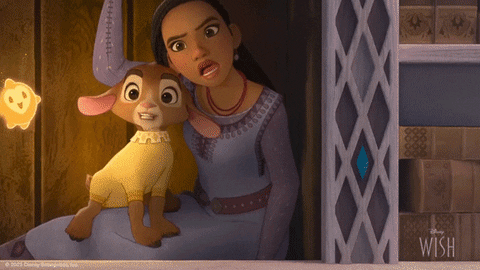
I’ll explain why, again: the message of Wish? Awful. Anti-Disney.
But they've been doing this for a long time. Saying one thing with their movies, and saying another with their PR and Disney Parks Soundtracks.
I'll explain.
Main Idea of Disney's Wish (and the You Are the Magic theme park song and merch): "The power to make your wishes come true is in you."
≠
Most Disney Movies' Idea on How to Have Wishes: "Do what's right, (trust a higher power) and something even more wonderful than what you wished will happen."
Don't try to argue with me about this. You have to look underneath the slogans and the sweater designs and the song titles to what the stories actually support to acknowledge this.
Because you can’t say “do what’s right” has power unless you answer the question “who gets to decide ‘what’s right?’” (Which, coincidentally, is a question Wish brings up and then doesn’t answer.)
Audiences of Disney used to accept that wishing on a star was much like prayer; there’s something you long for, and it’s out of your hands, but you wish for it and you do what you know is right in the meantime. And you’re not crushed, you’re not downhearted, because somewhere in your mind you trust that the combo of those two things—wishing on a higher power and diligence to do what’s good—will be what makes your wish come true.
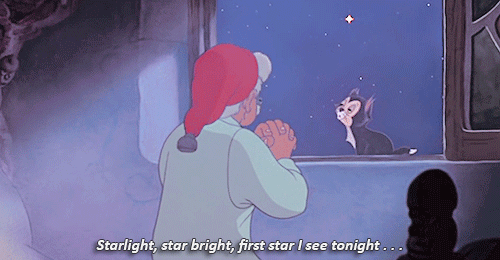
Trust in a higher power—COMBINED WITH:
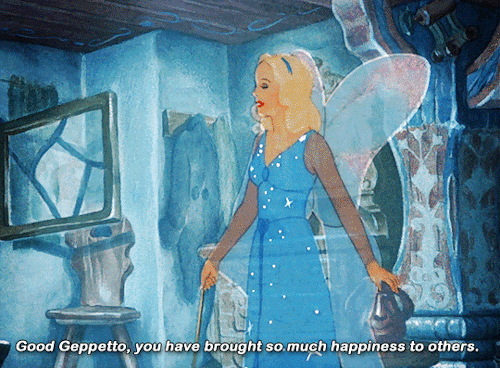
—diligence to do what’s good.
The Blue Fairy (higher power) gave Geppetto his wish specifically because he had demonstrated commitment to do good, whether he got what he wanted or not. The Fairy Godmother (higher power) gave Cinderella her wish specifically because she kept on being kind and good to low creatures like mice and wicked stepsisters, whether she got what she wanted or not.
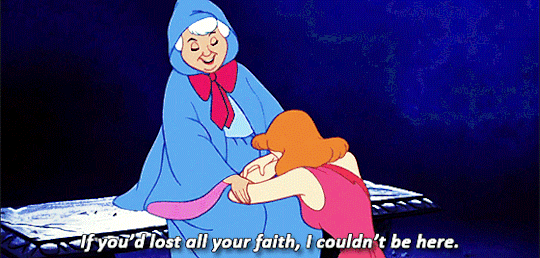
Do you know why that combo (higher power + diligence to do good) is impactful? Timeless? Important?
Because it’s selfless. You want something, but you’re not going to sacrifice doing the right thing to get it. You’re not going to focus so hard on making what you want a reality, on your own, that you miss out on things that could be more important than what you want. And, you’re not so self-focused as to believe that if you don’t do it, it won’t get done.
Jeez, that’s the whole point of The Princess and the Frog!

Tiana wishes to have her own restaurant, and she believes that only her own hard work will grant that wish. She misunderstands her dad’s advice before he dies. She isn’t willing to trust a higher power combined with her own diligence to do good—she only trusts her own ability.

It’s not until she realizes that Ray, the character of faith, was right all along that she learns—what she wished for was too self-focused. It wasn’t complete without love. Something bigger than herself. And getting that was never going to happen just based on her own hard work.
But you know what? It was never going to happen just by a “higher-power” flavored shortcut, either. Because Facilier offers her her wish if she’ll just trust him, no hard work needed. But what does she say?
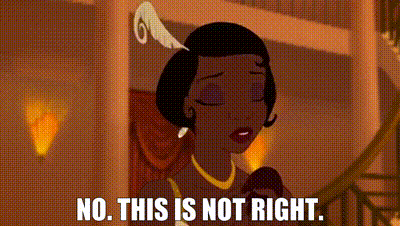
Trust in a higher power + diligence to do what’s right = selflessness, and getting more than you could have ever wished for. And if your wish is selfish, doing those two things will change your wish into something selfless.
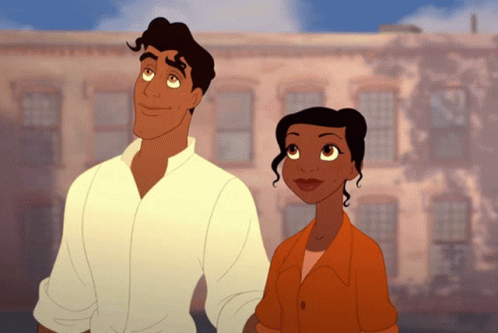
More examples? Get ‘em while they’re hot, in case Wish made you forget, just like the current #NotMyDisney executives have forgotten, what real Disney wishes are for.
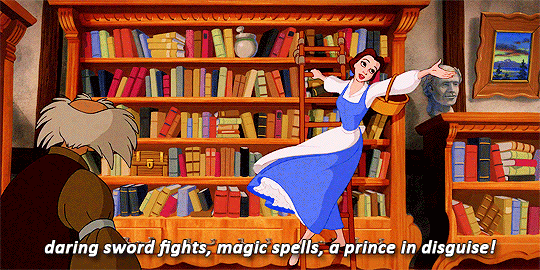
Belle wishes to have adventures in the great wide somewhere--but when she's imprisoned and that chance is taken from her it's not reversed because she worked hard to make her wish come true. It's granted because she gave up her wish for her father: she just did the right thing, regardless of her wish. And in the end, she does get what she wished for, which is adventure in an enchanted castle...and much more, because she gets true love, a throne, and a castle full of friends.
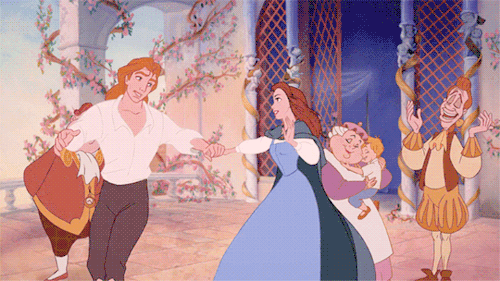
How about the One Who Started It All? The one Wish is failing to pay genuine tribute to?
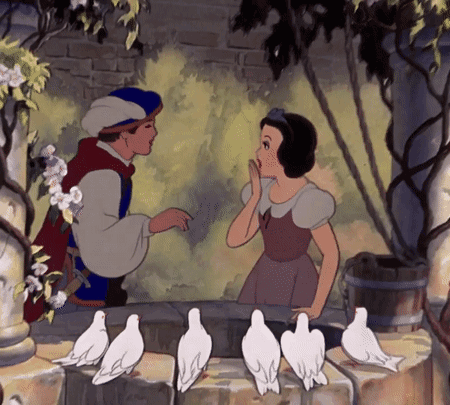
Snow White wishes for someone to love her, and he does--but when they're separated, she does not exercise power to make The Prince come back to her. Instead, she loves who she can where she’s at—the Dwarfs. In the meantime, she has faith that he will keep his promise, and that pure trust in a higher power outside of her control is a big contributing factor to why the Dwarfs come to love her, and learn from her...and in the end, even more than she could've wished happens. He does take her to his castle, but she also has seven new friends who also love her, and the Queen is dead. And she didn’t need to use “the power in her” to work harder and get it done. She just needed to not focus so much on herself at all.
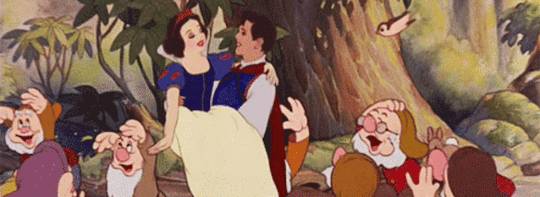
How about a male main character? One who’s wish starts out selfish, but after learning to wish on a higher power and be diligent to do the right thing, gets more than he could wish for?
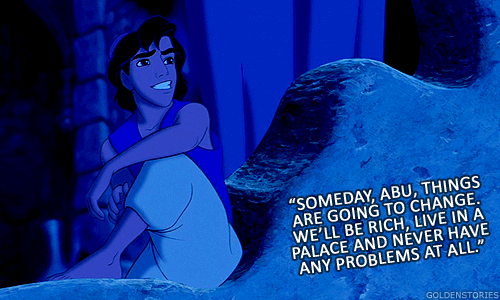
Aladdin wishes to be somebody different (somebody he believes Jasmine could love, somebody who lives in a palace and is respected and “never has any troubles at all.”)—but doing everything in his own power for that wish proves that it was selfish all along; so he switches to doing the right thing, regardless of if his wish comes true, and he gets even more than he could’ve wished. He gets real love with Jasmine, he gets his friend Genie, and he gets to be free from feeling “trapped” because he doesn’t have to hide who he is anymore.
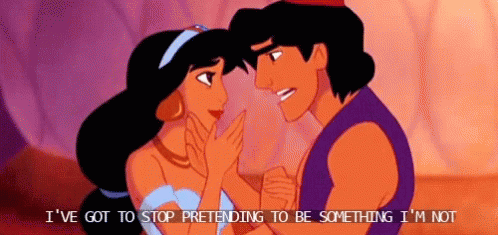
Or Simba?
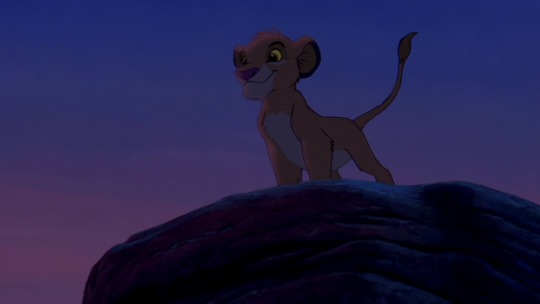
Simba wishes to get to do whatever he wants as King—but when Mufasa dies and he’s convinced it’s his fault, it isn’t for that wish that he goes back to Pride Rock to confront his past and his Uncle. It’s because he had an encounter with a higher power—his father—that helped him to realize his wish was selfish all along. He gives up the selfish wish, and he goes back to take his place as king, not so he can do whatever he wants, but so that he can take self-sacrificial responsibility that comes with ruling. And because he just does the right thing, finally, he gets more than what he wished for.
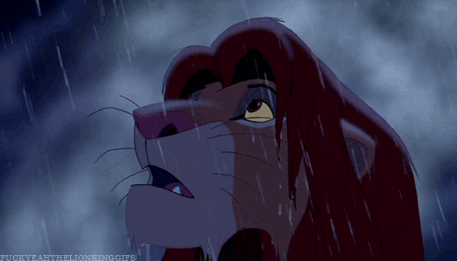
How about something more recent? Zootopia.
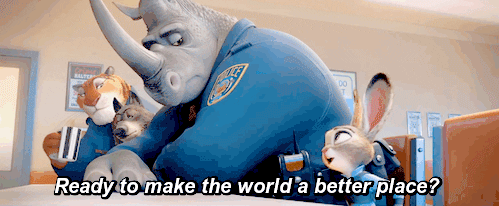
Judy wishes to make the world a better place by proving she can be what she wants to be and catching bad guys—but when she tries to make her wish happen on her own, in her own abilities, she fails and is forced to realize that she should’ve been looking for help by understanding “bad guys,” like Nick. It’s only after she humbled herself, admits she’s wrong, and changes her wish from “proving I can be what I want and catching bad guys” to “proving that understanding each other makes the world a better place” (much less self-focused) that her wish comes true—and so much more. She does make the world a better place, and she does get to catch bad guys, but she also gets to befriend one who was a good guy all along, and become all-around more effective at her dream job.
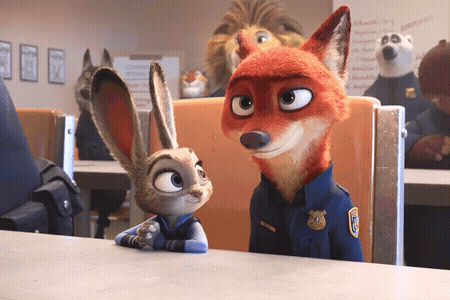
This is how Disney always has been. Because it’s at the heart of good storytelling, and even life (not to get too dramatic.)
The power is not in you. Because it’s not about you. Self-sacrifice, faith, and doing the next right thing regardless of if you get your heart’s fondest desire is what makes more than just your wishes come true. And there has to be belief in a higher power to make that message powerful.
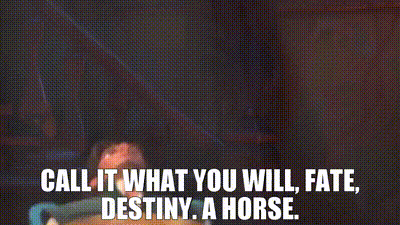
But Wish?
Not only is it bad at showing instead of telling. Not only is it lazy and soulless.
But it’s characters rip the Star out of the sky and say “don’t wish on this. Wish on yourself, to get what you wish for. You don’t need a higher power. You don’t even need to sacrifice to do what’s good—whatever you do is good, because you are the one doing it.”
That is wrong. That is not true, and it is not powerful. There’s no sacrifice in focusing on or placing your trust totally in yourself, and it undoes every good thing Disney has done up until now.
And it undoes it on the 100th anniversary, and it flaunts Easter eggs of the very things it’s undoing.
#pinocchio#disney#wish#Disney’s wish#wish Disney#Wish#Disney#meta#character analysis#storytelling#the princess and the frog#Disney fan#princess tiana#tiana#Naveen#Dr. Facilier#disney villains#asha#king Magnifico#Valentino#queen Amaya#ariana debose#chris pine#Cinderella#classic movies#film analysis#animated movies#animation#wish 2023#Aladdin
4K notes
·
View notes
Text
Disney's unconventional "Cinderella" (1950) (long)
Having watched most of the many adaptations of Cinderella, I've come to realize what a unique adaptation Disney's 1950 animated classic really is. Unlike Snow White, which only had a few stage and screen adaptations before Disney produced its groundbreaking film, Cinderella had already been adapted many times before Disney's turn came, and Disney's version makes a surprising number of departures from the standard Cinderella "formula." It was definitely a fresh, creative Cinderella when it made its debut, and it arguably still is. Yet because it's become so familiar in pop culture, and today so often serves as our childhood introduction to the tale, it's easy to overlook its inventive storytelling choices. The 2015 live action remake uses several classic Cinderella adaptation tropes that the original 1950 film actually subverts!
Here's a list of the often-overlooked ways in which Disney's Cinderella stands out from earlier adaptations, and from many later ones too.
Cinderella herself. Disney's Cinderella isn't a traditional Cinderella in personality. The "traditional" portrayal of Cinderella, seen in virtually every adaptation before Disney's and several afterwards too, is the portrayal I call "The Waif": a very young, fragile, melancholy girl, dressed in pathetic rags and smudged with ashes, who makes the audience want to rescue her and who wins the Prince's heart with her wide-eyed innocence and artless charm. But whether chiefly to set her apart from earlier screen Cinderellas or from Disney's earlier delicate ingenue Snow White, Disney's Cinderella is none of those things. She comes across as older, or at least more sophisticated. Nor is she waif-like, but instead combines down-to-earth warmth with ladylike dignity, even at her lowliest. She doesn't sit in the ashes ("Cinderella" is her real name in this version), and her servants' dress is humble yet clean and only slightly tattered. She's gentle and kind, yes, but also intelligent, practical, playful, sometimes sarcastic, philosophical, optimistic, genuinely cheerful when she's with her animal friends, and yet angrier and stronger-willed than virtually all earlier Cinderellas. She doesn't beg to go to the ball, but asserts her right to go, and then sets to work fixing up an old dress of her mother's for herself. Only her stepfamily's sabotage, first by keeping her too busy to finish the dress, and then by destroying it after the mice and birds finish it for her, prevents her from taking herself to the ball without a Fairy Godmother. To this day, she stands out as a complex, unique Cinderella, which pop culture too often forgets.
Lady Tremaine. Some critics today complain that Disney makes Cinderella's stepmother a total monster instead of giving her "nuance" and call her portrayal "sexist." But can't we agree that her sheer cruelty enhances the film's dramatic power? And compared to earlier portrayals of Cinderella's Stepmother, it definitely makes her stand out. In most pre-Disney Cinderellas and many after, the Stepmother is a pompous, vain comic antagonist. Once again, Disney was innovative by portraying Lady Tremaine as a dignified, manipulative, and truly sinister villain, who takes quietly sadistic pleasure in abusing Cinderella and will stop at nothing to prevent her from going to the ball or marrying the Prince. As far as I know, she's also the first Stepmother to realize before the slipper-fitting that Cinderella was the lady at the ball and to take action to prevent her from being found. That's a commonplace plot device in more recent adaptations, but in 1950 it was a creative twist!
The mice and other animals. Viewers debate whether Cinderella's mouse friends, Jaq, Gus, et al, and their misadventures evading Lucifer the Cat are a welcome addition or take away too much screen time from Cinderella herself. But there's no denying that the presence of the mice and birds is an inventive storytelling choice, which makes Disney's Cinderella stand out! And I can provide a long list of reasons why they're more than just "filler." (1) They add liveliness, humor, and appeal for younger children. (2) They gave the animators an outlet for the type of character animation they did best, rather than binding them to the harder work of animating realistic humans. (3) They give Cinderella someone to talk to besides her stepfamily. (4) They give her a way to demonstrate her kindness. (5) The struggles of the mice with Lucifer parallel Cinderella's abuse by her stepfamily, and Cinderella's undying optimism not only keeps her from despair, but inspires them too. (6) They arguably provide a further reason why Cinderella stays with her stepfamily – not only does she have nowhere to go, but an entire community of small sentient creatures relies on her for food and protection. (7) They reward Cinderella for her kindness. From the start, her friendship with the mice and birds makes her life easier to bear, both by easing her loneliness and because they do helpful deeds for her, like mending and cleaning her clothes. They fix up her mother's dress for her to wear to the ball – only the stepfamily's last-minute cruelty requires the Fairy Godmother to step in. And in the end, they're directly responsible for Cinderella's happy ending by freeing her from her locked room. They do all these things because Cinderella has protected them, fed them, made them clothes, and been their friend. Therefore, Cinderella's good fortune never feels "just handed" to her: her kindness directly earns it.
The Fairy Godmother. It's always varied between illustrators whether Cinderella's Fairy Godmother is portrayed as a grandmotherly old woman or as youthful, regal, and beautiful, but screen and stage adaptations before the Disney version virtually always took the "youthful, regal, beautiful" approach. That is, when they didn't change her into a wise, fatherly male magician-advisor, as in several opera adaptations! At any rate, seriousness and dignity were the norm for this character in most adaptations from the 19th century through the 1940s. Making her a sweet, comforting, grandmotherly figure, with a comically and adorably absent mind, was another of Disney's fresh choices.
Cinderella's entrance at the ball. We all know the classic image of Cinderella's entrance from other adaptations. Cinderella appears at the top of the grand staircase that leads down to the ballroom, and a hush falls over the assembly, as not only the Prince, but all the guests and members of the court are amazed by the unknown lady's beauty and magnificent dress. Even in versions without a staircase, Cinderella captivates the room the moment she enters. Adaptations both before and after Disney's, including Disney's own 2015 live action remake, play her entrance this way. But the 1950 animated classic subverts it! The grand staircase leads up to the ballroom, not down to it, and Cinderella's entrance isn't a triumph at first, but a vulnerable moment as she makes her way up the stairs alone, dwarfed by the splendor around her. Then, when she reaches the ballroom, no one notices her at first, because the other ladies are being presented to the Prince and all eyes are on him. But then the Prince notices her in the shadowy background as she quietly marvels at her surroundings, and leaves his post to approach her and invite her to dance. Only then does the rest of the assembly notice her, because she's the one the Prince has singled out. It's more understated and it feels more realistic than the traditional entrance, as well as more clearly symbolic of Cinderella's venturing above her station, then both literally and figuratively being led out of the shadows by the Prince's unexpected attention.
The slipper-fitting plan. Over the years, it's been fairly popular to mock the idea of using the glass slipper to find the Prince's love, as if there were no chance it would fit anyone else. Disney's version is creative by having the slipper-fitting search be the comical, hot-blooded King's idea, not the Prince's, and making it clear that it's not, nor is it meant to be, a foolproof plan to find Cinderella. The Duke points out that the slipper could fit any number of girls, but the King doesn't care if they find the right girl or not: he just wants to hold his son to his pledge to marry "the girl who fits this slipper" and force him to marry the first one who fits it. This also means that Disney doesn't do what most adaptations do and have the Prince conduct the search himself, but follows the original Perrault tale by having a gentleman, in this case the Grand Duke, do it instead. This prevents audiences from mocking the Prince for relying on the slipper instead of knowing his beloved's face.
Cinderella breaking free and asking to try on the slipper. Even though in Perrault's original tale, Cinderella asks to try on the slipper, she almost never does in adaptations. In most versions other than Disney's, including Disney's own 2015 remake, Cinderella's presence in the house (and/or the fact that she has the other slipper) is either discovered by accident or revealed by Cinderella's allies, not by Cinderella's own initiative. In some versions, she even tries to hide from the Prince and/or the search party, either out of fear of her stepfamily or because she feels unworthy of the Prince in her rags. But not Disney's animated Cinderella! First of all, she has an assertive emotional breakthrough when she calls on her dog Bruno to chase Lucifer away and free Gus to slip her the key to her locked room. Earlier on, she urges Bruno to try to get along with Lucifer, lest the stepfamily not allow him to sleep in the house – it's clear that Bruno represents her own rebellious side, and in that scene she's really talking about herself, revealing that she tolerates her stepfamily's abuse so she won't lose her own "nice warm bed" and be homeless. But in the climactic scene, when she finally sees a way out, she gives up playing nice and seizes her chance. First she unleashes Bruno on Lucifer, and then she runs downstairs and directly asks to try on the slipper, not caring how her stepfamily will react, or what the Grand Duke will think of her shabby dress, or whether the audience will accuse her of gold-digging or not. This isn't a common breakthrough in other Cinderella adaptations, but it fits perfectly (like a glass slipper, you might say) with the Disney Cinderella's stronger-willed and more self-assured characterization.
"I have the other slipper." We can probably all safely assume that when audiences first saw Disney's Cinderella in 1950, they all expected Cinderella to try on the glass slipper she lost, with her identity revealed by its perfect fit. They never would have expected Lady Tremaine to trip the footman and break the glass slipper... only for Cinderella to calmly reveal that she has the other one. It's yet another clever and unexpected twist, not seen in any other version. Not even Disney's own 2015 remake.
Disney's Cinderella deserves far more credit than it gets for being unique among the myriad versions of the tale, especially compared to the versions that came before it.
5K notes
·
View notes
Text
Of Course a Prince Needs a Princess

Characters: Yandere Prince x Female (Y/N) In which you reincarnate into a fairytale where Yan!Prince wants his happy ending too
𝑃̲𝑟̲𝑜̲𝑙̲𝑜̲𝑔̲𝑢̲𝑒̲
Having a second chance at life in exchange for the death of your previous one came with a crash. You weren't sure how it happened, but you luckily retained your memories and your wit.
It didn't take long to find out you were in a world akin to Cinderella's story--from the stepmothers to the talking mice to the royalty the citizens praised. Unfortunately, you weren't looking to live in a grand castle. Or maybe you were, but not with being married to a man you don't have feelings for. The original couple got together so quick, yet they barely knew each other. That story was definitely as it was: a work of fiction
Your new plan? Put up with the stepsisters, find a job elsewhere, and make enough bank to live comfortably in the village away from your family. You've never heard of laws in Cinderella's fairytale, but you were certain that the kingdom couldn't possibly force citizens to live with toxic family members.
𝑇̲ℎ̲𝑒̲ 𝐵̲𝑎̲𝑙̲𝑙̲
After spending a few months doing chores and odd jobs around the village (the latter for some extra cash), your family finally received news of the fated ball.
You initially didn't plan on going, but you deserved a break. You didn't bother asking for permission to go; your stepmother definitely wouldn't allow it. The main problem was summoning Fairy Godmother.
Luckily, she couldn't tell the difference between fake tears and real ones. You behaved as close to the actual Cinderella as you could recall, and POOF!
With your new attire and coach, you made your way to the most gorgeous castle your eyes have ever fell upon.
It didn't take long for the prince to notice you, but this is where you drew the line at this fairytale life. You rejected his proposal to dance, shocking the other guests. You had to resist a smirk at your step-family's reaction.
Flabbergasted, the prince left you swiftly and moved onto another fair maiden. You indulged yourself in the catering happily, but after your stomach was filled, the stares of passerby began to discomfort you. The prince was occupied with another dance, so you wasted no time leaving the palace early (much to the confusion of the knights who stood guard).
The spell broke while at home with no evidence of your night out, not even the glass slippers. When your stepfamily returned, they bragged about their time and briefly talked about you (luckily not knowing you were the one who was "stuffing their face like a pig starved."). After that day, life returned to normal.
Or at least what you thought was going to be normal.
𝘙͜𝘶͜𝘯͜𝘢͜𝘸͜𝘢͜𝘺͜ 𝘊͜𝘪͜𝘯͜𝘥͜𝘦͜𝘳͜𝘦͜𝘭͜𝘭͜𝘢͜
Beginning that night, Yan!Prince thought about you often. He never imagined a young lady would ever reject his proposal to dance, though he didn't hold it against you. It was just a shocker.
Despite that, you appeared in his mind before bed and after he woke up, while he ate and while sharpening his combat skills. Even if he told himself that that one incident was nothing more than a brief interaction with a citizen of his kingdom, he couldn't forget the color of your hair, your pretty face, and how you paid oh so much attention to the food his family prepared just for that ball.
Upon overhearing the chefs gush about their gratefulness towards their food being appreciated so much, he made up a personality for you: kind but forward, honest, valuing true intentions and love over gold and high status.
Too bad for him, gold was your highest priority. While he began going on strolls into the village in search of you under the impression of catching up with the townsfolk, you continued job-hunting and tending to the house. You even decided to cater to your stepfamily as best as possible--subtle enough so they wouldn't think you were trying to suck up to them.
Surprisingly, your relationship with them improved just a bit. But it was what you needed to get permission to work at a bakery in the village.
Once you discovered he was visiting the village often, you did your best to avoid the bakery window while working and hurry home once your shift ended.
Unfortunately, you both ran into each other just as you closed up shop. In a small panic, you inquired about him for the sake of courtesy. While you two spoke, he couldn't help but notice a striking resemblance between you and the lady who turned him down at the ball. You could tell from his facial expression he was piecing things together, so you abruptly bid farewell and ran away.
He would visit you a lot. After replying to his inquiry that you weren't the girl at the ball, he'd joke about it a lot (there was no other gal in the village like you). It didn't take long for rumors to spread amongst the kingdom that the prince had taken a fancy to you. You hated it. He didn't mind it. In fact, it no longer mattered whether you were the girl at the ball. Something about you pulled him in like a hook. Perhaps it was the determination he observed through the window. Perhaps it was the way you handled children while taking a breather outside as he ate inside. Perhaps it was destiny.
As time passed, you grew more tolerant of him. While you didn't want him to be your romantic partner, you guessed you were okay with being his friend. As time passed, he grew more frustrated you weren't his. His father took note of his unusual agitated self, but he waved it off as stress when thinking of a future bride.
"What about that lady the people are saying you like?"
"Oh, her? She has....a way with herself. It seems that she's not interested in me."
"Perhaps you both need a bit of a push."
Since then, the King made a few visits to the bakery to chat--no marriage mentioned. He wanted to see what you were like. Although you were a kind girl, he confronted Yan!Prince with the truth that he probably wouldn't have a spouse who didn't want him. It broke his heart to hear, but he wasn't ready to let go yet.
You were already preparing your escape long before the ball, but the pace of your plan sped up now that the prince was on your trail. You found out about the closest kingdom from acquaintances and saved up funds to use on your journey.
When the prince discovered you had quit your job via a disappearance, he visited your home. Your stepfamily was in shambles (literally. The place was filthy.) and shared that you had disappeared overnight with your belongings. There was no mistake in it: you had abandoned him.
Framing your escape as a possible kidnapping, he ordered guards and encouraged the rest of the kingdom to search for you. All of his efforts was on the search.
Photography didn't exist, so you were fortunate that the description he gave out about your appearance was vague. Somehow, you made it to the nearest kingdom with a plea to the guards that you made your way there in search of a better life. The Queen was kind and sponsored a place for you to stay for the first five months while you adjusted to your new life in exchange for you finding a job. It didn't take long to do so with your desperation.
In no time, you were living a much happier life in your home, with your new friends, and even someone who kept catching your eye. Talk of the nearby kingdom's drama was entertaining, even more so with the subject amongst them.
Meanwhile, the prince's mental and physical wellbeing deteriorated. Some say the search took a lot out of him. Some say he was so heartbroken, he had no will to live. Maids in the castle whispered about the prince being locked in his room from the outside because he grew violent--so out of character! Disturbed, the King confided in only those closest to him about his woes. Whatever did that woman do to infatuate his son so much! No one could approach him anymore. He ate and drank only when he needed to. His room became a mess. How did such a sorrow fall on the family of royal blood when there was so much potential for happiness to look forward to?
Anyone could guess that were was no point in a happy ending for romantic fairytale if there was no romance to begin with.
#fanfic#fanfiction#writing#writerscommunity#x y/n#x reader#reader insert#y/n#female reader#fairy tale retelling#cinderella#yandere x reader#yandere male#yandere x female reader#yandere x y/n#yandere x darling#yandere x you#tw yandere#unrequited love#not a happy ending
2K notes
·
View notes